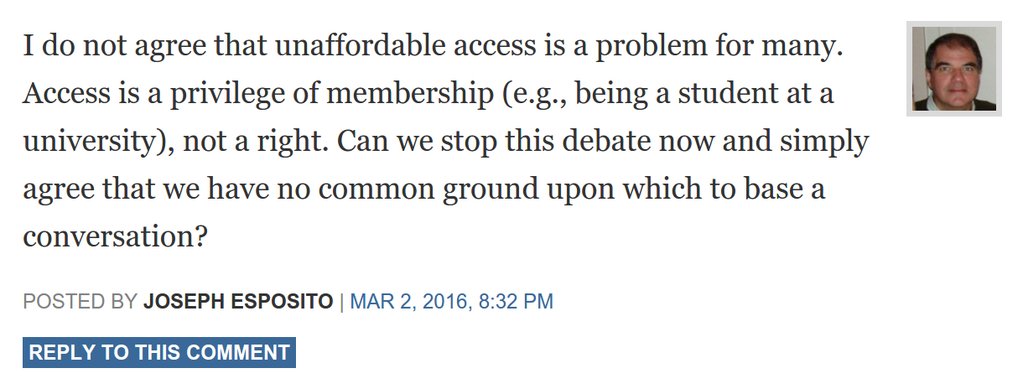
THE STORY SO FAR: Erin McKiernan can’t get access to the research she needs in Mexico, Mohammad M.M.H can’t get it in Jordan, and Nora Turoman can’t get it in Serbia.

THE STORY SO FAR: Erin McKiernan can’t get access to the research she needs in Mexico, Mohammad M.M.H can’t get it in Jordan, and Nora Turoman can’t get it in Serbia.
Whatever else Sci-Hub may or may not be, it’s becoming apparent that it functions as a litmus test. It focuses people’s thoughts on the problems of scholarly communication, and draws out their ideas in their clearest form. Who is sympathetic? For example, on one side, you have Duke librarian Kevin Smith, whose radical thoughts about Sci-Hub are radical in the literal sense of the word: going to the root.

Three years ago, representatives of libraries, publishers and scholars all agreed that academic publishers don’t really add any value to scholarly articles. Last week, I interpreted Sci-Hub potentially being a consequence of scholars having become tired after 20 years of trying to wrestle their literature from the publishers’ stranglehold by small baby-steps and through negotiations and campaigning alone.

Es ist ein zynisches Schauspiel, welches Subskriptionsverlage immer dann wieder vorführen, wenn der freie Zugang zu Forschungsresultaten ein bisschen höher auf der Agenda ist als sonst. So zum Beispiel bei der aktuellen Zika Epidemie.

I’ve been a bit nonplussed recently to see some strange claims about Alexandra Elbakyan, the creator of Sci-Hub. For example, this from Angela Cochrane in an article at the Scholarly Kitchen : I don’t think that’s the case at all. Nothing Elbakyan has said seems to communicate the kind of arrogance or exceptionalism that this implies.
The Chronicle of Higher Education ’s piece on Sci-Hub contains a disturbing claim that I’ve not seen elsewhere. I’ll quote: If this is true, then it certainly undermines the narrative of Sci-Hub as hero.

Die Europäische Kommission hat einen umfangreichen Bericht zum Stand von Open Science in den Mitgliedstaaten veröffentlich: Access to and Preservation of Scientific Information in Europe. Report on the implementation of Commission Recommendation C(2012) 4890 final. DOI: 10.2777/975917.

So, Sci-Hub is the talk of the town. Everyone’s talking about it. I spent Friday afternoon at Manchester University library, giving a couple of taks about open access, and hearing several others about copyright. It was fascinating being a room full of librarians, all of them aware that Sci-Hub is out there, all of them torn between disapproval and excitement. As Martin Eve said on Twitter: Me, I’m not so sure whether I can condone it or not.

In the world of novel-writing, people spend their own time creating art — writing. Creative works come into being, and their copyright is (at least initially) owned by the creators.

Thirteen years ago, Kenneth Adelman photographed part of the California coastline from the air. His images were published as part of a set of 12,000 in the California Coastal Records Project. One of those photos showed the Malibu home of the singer Barbra Streisand. In one of the most ill-considered moves in history, Streisand sued Adelman for violation of privacy.